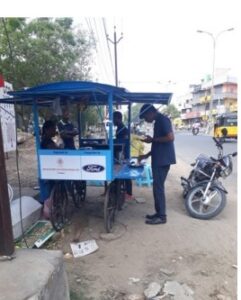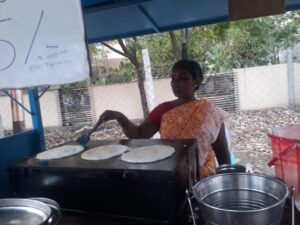Fostering Independence for Shneka through “Mobile Cart Livelihood Support Project,”

In the bustling locality of Meenakshi Nagar, Porur, Chennai, lives Shneka V, a 24-year-old woman with a mental disability, a condition that presents significant challenges not only to her but also to her family. With her father earning a modest income as a coolie and her mother, Priya Sundari, dedicated to full-time caregiving, Shneka’s family struggled to make ends meet. Burdened by medical expenses and constrained by their scarce resources, the prospect of economic independence for Shneka seemed bleak.
Intervention by TNDFCT:
Recognizing the challenges faced by Shneka and her family, the Tamil Nadu Disabled Foundation Charitable Trust (TNDFCT) stepped in with a transformative opportunity. Priya Sundari, Shneka’s mother, was identified as a beneficiary under the mobile cart livelihood support project sponsored by Ford Motors Pvt. Ltd. This initiative aimed to empower individuals and families of the disabled by providing them with the means to start their own small businesses.
With a vision to foster independence and enhance the family’s financial stability, TNDFCT provided Priya Sundari with a financial assistance of Rs.10,000. This grant was allocated for the purchase of a mobile cart and the acquisition of essential materials required to establish a Shop. Moreover, Priya received entrepreneurial skill training, equipping her with the necessary knowledge and competencies to operate a successful enterprise.
Outcomes:
The intervention marked a significant turning point in the lives of Shneka and her family. With the establishment of the shop, an endeavor rooted in the collaborative spirit and support of her mother, Shneka embarked on a journey of economic independence. The shop, generating a steady daily income of Rs.500, alleviated the financial pressures that once seemed insurmountable.
Most importantly, the venture reversed the roles within the family dynamic. Shneka, who was once perceived as a burden due to her condition and the associated care expenses, transformed into a contributor to the family’s livelihood. This shift not only improved the material conditions of her life but also enhanced her self-esteem and sense of purpose.
Reflection:
Shneka’s story is a testament to the positive impact of targeted support and empowerment on individuals with disabilities and their families. Through the provision of financial assistance, entrepreneurial training, and moral support, TNDFCT and its partners have enabled Shneka and her mother to unlock potential they never knew they had. This case study underscores the importance of community and organizational support in nurturing the capacities of disabled individuals to contribute meaningfully to their families and society. It highlights a path forward that emphasizes dignity, autonomy, and the transformative power of entrepreneurship.



